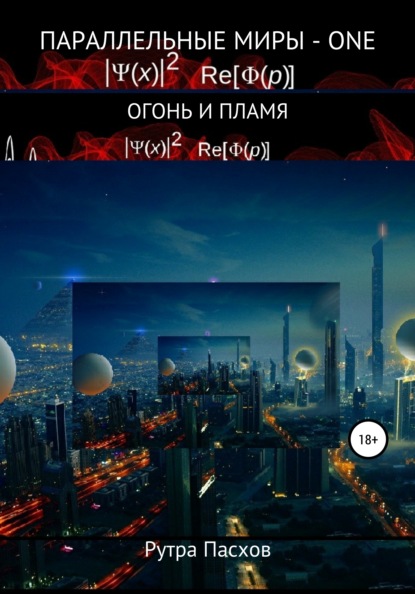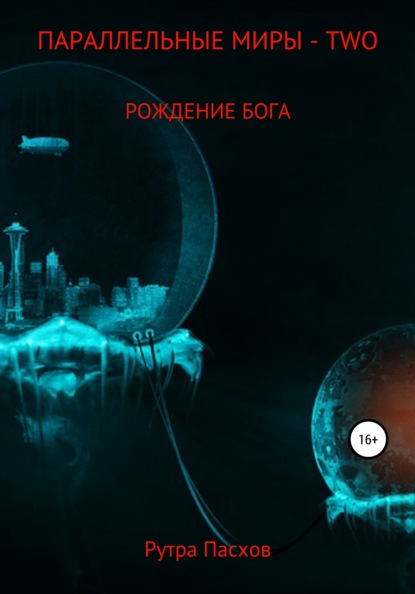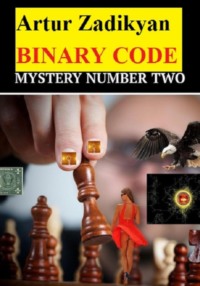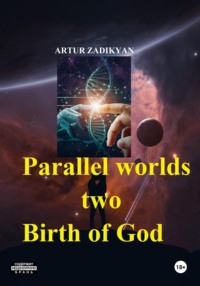
Полная версия
Jesus and Christ
The holographic image of a Semitic or Arab man on the stage, dressed in the garb of the beginning of the era, laughed, revealing the yellowness of his grin. In the audience, his laughter and facial expressions evoked apprehension and dislike rather than emotional support. Those gathered pondered who he was, and thought about solving the mystery of the millennia. The hall was suspiciously silent, and tension was in the air.
– I promise you will learn this secret during the mission," Rangit hastened to defuse the situation with the same broad smile.
This time she elicited a response, after a couple seconds and a few sighs the hall began to whisper.
– Now let's go back. Let's go back to blood and water, or rather, water. And let's not forget the time of the writing of the Gospels. That is, with the passage of time, the story has been overgrown with inaccuracies and additions, misinterpretation, incorrect explanation. What to speak of editing, much less the extant version. Although the mention of water is not of great importance to us, I have focused on it incidentally, for attention to the form of the narrative and to the variants of the story. Many consider it a sign of death. But why? Does water ooze out of a dead body? I assure you, no.
This last statement elicited the now customary slight smile from the audience. The so-called Jesus smiled back and continued:
– Let's move on. Such a speedy death of Christ surprised not only those present, but Pilate himself. I will quote again: "…Joseph of Arimathea, a famous member of the council, who himself was expecting the kingdom of God, came and dared to enter Pilate, and asked for the body of Jesus. Pilate was surprised that He was already dead, and calling the centurion, asked him how long had He been dead? And having learned from the centurion, he gave the body to Joseph" (Mark 15:43-45). There is an opinion of a specialist in forensic medicine on this case. Here it is.
In the space in front of the audience appeared a text in a frame of three-dimensional letters, perceived as a 3D image.
– Quote: "…The noted series of circumstances of the death of Jesus Christ, which is given in the Gospels, namely – the relatively rapid onset of death, the ability of Jesus Christ to clearly pronounce words until the last minutes of life, the clarity of consciousness retained by the crucified man until his death, as well as the flow of blood and water that flowed from the wound inflicted on him posthumously by a spear, allow us to doubt the validity of the asphyxial genesis of Christ's death...." Realizing these inconsistencies, experts began to look for other causes of Jesus' death. True, they did not think about the main factor, but about it later. I will not disclose it for the time being. While on this issue I will voice the following: in 1949 in The Hibbert Journal there was published an article by R. Primrose, "The Surgeon looks at Jesus' death. Primrose "A Surgeon Looks at the Crucifixion", where it was claimed that the death of Jesus Christ on the cross was imaginary, and the lethal outcome was caused by a spear thrust. At first this version was accepted as true. After experts decided that this is a mistake. That is, in their opinion, I note – professional, it could not be with a dead man. Especially, I note again, water. And again I remind you, perhaps it is not about water… or water is mentioned in an allegorical sense. There are other opinions as to why Jesus died. Here are some …cardiac arrhythmia (Johnson C., 1978), progressive acidosis (Wijffels F., 2000), pulmonary embolism (Brenner B., 2005) led to the rapid onset of death. However, they do not explain the oozing of blood and water from the wound inflicted by the spear. There are various versions of the cause of Jesus' death, as well as his physiological and psychological state during the execution, but the main factor should be taken into account – there is no data in the Gospels that could testify to any change of consciousness in Christ. All his speeches on the cross and his behavior are completely sensible. That is why this version is the closest for me. Of course, if we do not take into account the factor that I have not yet voiced. Or rather, this is the version, which, by the way, we have to check.
Having said the last, Rangit, having made a turn around his axis, suddenly appeared in the holographic image of a famous scientist showing his tongue. It happened masterfully and spectacularly – the audience expressed their feelings with a second's delay. They were vague emotions, but the flashes of admiration and surprise showed the brightness of their colors. The hyped-up brand of imagery intrigued, and the sight of a comical grandfather with his tongue sticking out made the audience laugh. The listeners, who, although attentive, but without emotion, calmly, perceived the information, buzzed, expressing in whispers a clear interest.
– Among other things," Rangit added, smiling, realizing the delight in the change of image, "the mission will be sent to different worlds to verify the different variations of the Gospel story. After all, there are reasonable assumptions that there was no such story at all.
He silently began to scratch his head amusedly, looked at his audience stupidly, said quietly, as if in confidence:
– There was no whole person image at all – one Savior. So Jesus is a collective image…perhaps.
After saying this, he maintained the silence in the room with silence on the stage, waiting for the thought processes to end.
– Now let's move on to completion… and I won't torture you any more," Rangit informed in the voice of a movie character.
– Really like Pilate," said the lady, who looked like the famous French singer Mireille Mathieu, with a comical grimace.
She was known to her colleagues in the expert community by her star name Venus. She clearly wanted to tease the ISKIN, judging by her cocky manner.
– Did Pilate express himself like that? – Rangit threw back.
– That's just what we'll check," she parried without a fraction of strain.
– All right, let's hear it," the lecturer continued, taking on his original appearance in an instant.
This time the reincarnation energized the audience and caused fun.
Satisfied with the response Jesus continued:
– After scrupulously examining the many theories of Jesus' death, M. W. Maslen and P. D. Mitchell (2006) expressed doubts about all the medical versions that explain Jesus' death. In their opinion, not one version can adequately explain the death of Christ. These experts suggested that possible new archaeological or some other, preferably written, evidence, such as the Qumran evidence, might clarify the true cause of Christ's death. It should be noted that the ancient Greeks and Romans referred to the liquid part of blood, as well as all transparent body fluids (e.g., pericardial fluid) as water. The Romans used the word lympha to refer to the water that is part of the blood and flows through the body, while the Greeks used the word hydōr. Note that doctors and biologists of all countries still refer to the liquid part of the blood as lymph, and use the root hydōr to refer to the accumulation of fluids in individual body cavities. Yet this does not explain the event authentically described in the Gospel, nor does it speak of a real physical process.
Saying the last, Rangit did the same trick, turning around himself, appearing for a moment in the image of the genie from "One Thousand and One Nights," with the jug on the floor being quite real, said:
– I'll dematerialize," he climbed into the jug and… disappeared with it.
To say that the audience was bewildered is possible. But that would not reflect their true state of mind, for Rangit could "read" their thoughts. Knowing, he waited. And when the degree of neuron excitement began to subside – it appeared again, making the contacts of dendrites and axons shimmer – Darth Vedder appeared on the stage.
The listeners looked at the holographic image in silence, which apparently did not suit Rangit, so his image changed. In his next incarnation, he appeared as a character from the same Star Wars epic, a C-3PO droid. It was a humanoid (in form), somewhat comical character that amused the audience. When the audience moved away from the magic tricks, it was time for discussion. It was an easy outlet for overheated brains. Without waiting for the end of the mild controversy that arose spontaneously in the audience, a lady, a statistician of the World Council of Churches, said:
– Don't tell me you have everything.
Rangit replied in the same style.
– That's it. The rest, I'm sorry, is in the mission itself.
Chapter 6. Where faith ends and religion begins

Rutra came on stage, smiling, and asked:
– What do you think of our showman?
– Quite," came the lady's alto.
– Is this technology patented? – the question was asked.
The voice belonged to the world-famous founder of the Internet giant, who had the status of a Bilderberg Club member.
Ruthra smiled, and it was clear from the questioner's answering smile that he knew the answer to his own question.
Then Rutra, waving his hands as if to ask "no more questions?", introduced the experts to the keynote speaker:
– Our longtime friend, a professor of theology at the Institute of World Culture… he will tell you the story of our subject in a multivariate focus and perspective. I hope you find him fascinating. Questions are welcome. From time to time, ISKIN and possibly me will enter into the dialog, and you will not necessarily see me.
Suddenly, Rangit appeared in his original form, then began to alternate between the characters he was, and finally took on the image of… Rutra. The audience, already quite tempted by his manners, gasped. Rutra responded to their cheers and exclamations with a clarification:
– Get used to him. Everyone here has already gotten used to it and adopted the slogan: "He is always with us, he is always with you, he is always everywhere". As you have probably already realized, Rangit is an integral part of our team and our experiment together with you. By the way, he was born here, in the secret center of scientific research, at a depth of 147 meters, in the Nordenskjöld Bay of the Novaya Zemlya archipelago. So he is in his homeland, although he can be anywhere.
A wave of questioning looks passed among the audience.
– So the server that reflects us is out there? – asked one of the experts, the head of the International Institute of Globalization Problems.
– Rather than a server, it's more like a processor station," explained the I.T. guy, co-chairman of the Internet giant's board of directors.
Rutra decided not to distract the meeting with details, especially since it was classified information anyway, so tacitly emphasizing the possibility of the Sphere Concern was enough.
– So, if I may have your attention, Professor of Theology," Rutra pronounced the name of the institution in Italian, "Istituto per le Opere di Religione, Nomor Ffitnop. Let me make it clear again, you can not only listen, but also ask questions.
A man in his sixties, slightly taller than average, slender, in a white robe, gray-haired, came from backstage. For those who understood, he was a presbyter. He had an elongated face, very white, even sickly white, and a melodious voice. The latter became clear as soon as he began to speak. And he began as soon as two assistants helped him to make himself comfortable at the table.
– I greet you, my friends," the theologian began sweetly. – I suppose I have the right to address you that way," he said, looking at the audience, his head slightly raised. – I usually say my children," he smiled again. – I am concerned about the perception of such an address in our time. Many people nowadays have come to regard it very inadequately. I am thankful for the acceptance of all of us as God's creatures. Please forgive me for such a beginning. Believe me, in other audiences and on other topics I conduct dry scientific dialectics. In this case, because of the similarity of the topic, I would say, because of their intersection… – he stopped talking, rolled his eyes a little, thought about something, then added: – Let me explain my position on dialectics. I put the following meaning into dialectics. Or rather, to put the sense – it would be wrongly said. Probably, it is a definition. Judge for yourself, if we take dialectics as such… – he was silent again, – or rather, you most likely know this definition of dialectics – a method of argumentation in philosophy, as well as a form and method of reflexive theoretical thinking, which investigates the contradictions found in the conceivable content of this thinking. Speaking in earthly terms, I will allow myself to make such a joke, – the art of arguing, of reasoning. But please note that dialectics has another definition, and that is the key to my…" the theologian looked at Rutra, "a speech, perhaps," he said, receiving a mutual smile, "a lecture or a report, whoever will accept it," the theologian added, and looked intently into the hall, studying the facial expressions of his listeners. – I will apply dialectics, without reducing the degree of attention of observation, as a philosophical science of universal laws of movement and development of nature, human society and thinking. As a scientific method of cognition of eternally moving and changing phenomena of nature and society by revealing internal contradictions and struggle of opposites, leading to a leapfrog transition from one quality to another.
Ruthra tapped his fingers lightly on the table, signaling to the professor. He nodded, realizing his procrastination, exchanged a friendly smile, and began to speak.
– So, I hope you have not forgotten about the beginning," he smiled, raised the index finger of his left hand demonstratively upwards, and said instructively, "in the beginning was the word. I beg your pardon, it was a joke, in terms of my beginning, – he smiled again at the audience. – I wanted to remind you of the beginning of my dialog with you. That is what I will be emphasizing. I hope that the dialog will take place and that we will not violate the truth in the dispute," he looked at Rutra again, "everything will be within the laws, God's or the metaphysics of the universe.
Such dialog cheered up the bored audience, and laughter ran through the hall.
– Honorable gentlemen," the theologian went on, "I confess that I would have liked to debate the main subject of the Honorable Master's experiment," he pointed with a graceful gesture of the palm of his hand at Rutra, "but the Lord has called me here for another purpose. I was speaking of life," Ffitnop continued with a serious face. – If life must be different on other worlds, why is it different on Earth? Intelligent life. For all the diversity of forms, only humans have become intelligent. Though other species live longer if you look at evolution. So there's a universal rule.
– Why are there twelve apostles and only four gospels? – suddenly came from the audience.
This was the same software engineer who was known online under the nickname Hacker in Law.
– No," replied the professor, not the least bit embarrassed. – Everything is not simple there at all. And there are more Gospels, and not all those who wrote are apostles of Christ. It's not all there at all as we know it. Well, let's just say it's not exactly as we know it. Before I begin, I'm going to summarize the chapters of the Gospels of Matthew, Mark, Luke, and John. This will enable you to understand the story, the narrative that most people understand.
– The majority? – came over the air, and it was a woman's voice.
– Yes," replied Ffitnop, glancing around for the coloratura soprano.
The hall was differently lit, decently darkened, so it created a magical flavor.
– There are four versions. And they all belong to the so-called Abrahamic religions," the theologian explained.
– To what? – this question came from a programmer.
He and the lady who had asked the question before were sitting next to each other, whispering about something in a very friendly way, judging by the muffled giggles. The lady had been explaining something to the man since the beginning of the meeting, often using gestures.
The presbyter did not elaborate. He looked around the room, apparently waiting for each one to reveal the subject personally. His calculation was correct.
– They are called Abrahamic after the name of their inventor," the lady began to explain to all her classmates with an expression of pleasure at the opportunity to express her understanding, glancing at Rutra and the instructor-informant.
Her friend, who was both an employee of UNICEF, the United Nations Children's Fund, entered the conversation a little unapologetically. From what she said, the degree of awareness at the domestic level became clear.
– There was an Abram once. You know the biblical Abraham, don't you? It's the same person. He invented all these religions," she explained, looking around at her neighbors.
Hearing the muffled smirks, she clarified in a disgruntled tone:
– Well, not invented – founded, substantiated, is a founding father… is that better?
After a couple seconds of silent reaction from the audience, she summarized:
– Four, as far as I know.
Here, apparently, Nomor couldn't take it anymore.
– Mademoiselle, if I may call you so," he addressed her affectionately, stretching out his words, "and tell me, for God's sake, what are the four?
– Why are you doing this? I didn't hurt you," she said indignantly, as if they were parties in a court of law.
His opponent made a surprised expression and rounded his eyes, raising his eyebrows.
– Are you saying I don't know what I'm talking about? – she continued.
– What makes you think that? – the professor parried. – I didn't mean to offend you in the slightest. Let's hear your version in more detail, then.
Already all present were waiting with interest for the sequel.
– Well there is Orthodoxy, Catholics, Muslims, and the Jews' own religion.
Now she looked questioningly at Nomore, as if waiting for his approval. The assistants slightly increased the light in the auditorium.
– Go on," he asked her with a sense of pleasure.
– And what to go on, here they are all invented by Abraham.
After a second of comprehension, she added:
– No, not that he invented it, no: others invented it on the basis of his conjecture about monotheism. That's what it's called, isn't it? – she asked a little more quietly.
The instructor sighed, thumbs up.
– Let me make it clear. I have to familiarize you briefly with the content of the Gospel, and then I can go into more detail about all religions. Is there anything else anyone else wants to explain?
Everyone chose to remain silent. There was irony on the faces of some members about the interpretation of Venus. This code name was established by Rutra in the program documents, which could be shared, without the "top secret" stamp. Following this fabula, the head of the Jupiter concern received the code name of the mentioned planet.
– Unity, – realizing the reluctance of the audience to express their opinion, began the theologian, – that is, belief in one God, and a humanoid one at that, is the highest degree of development of the spiritual thought of mankind. Earlier, before Christianity, and even now in many beliefs, there was paganism. There were many gods. All of them were different, each was in charge of his own celestial economy and was the master of some forces and phenomena of nature. One of the first who decided to make a religious revolution was Amenhotep IV, one of the pharaohs of Egypt. Amenhotep IV plotted a great religious reform to replace the ancient traditional form of polytheism with a new cult of a single solar god. There were certain socio-economic reasons behind this reform. This idea of Amenhotep IV was supported by the majority of the population of Egypt. Of course, it was mostly ordinary people. The reason was the following: conquest wars of pharaohs of XVIII dynasty led to enrichment of only a small group of court nobility and severely reflected on a position of the laboring population of the country, and the most important, why the reform was religious – the largest riches were accumulated in temples. By the way, the roots of Christianity from the same place. Or rather, in the volume of the general theme that emerged. All religions, the Abrahamic ones, come from there, in fact. Partially, of course. Moses adopted many of the rituals. He is usually described in the context of "without dignity or rank," but many scholars claim he was a cleric. That is, he was a religious figure. A kind of religious dissident. So he decided to justify his religion. I will say even more, and this is not only my personal opinion, let it not be blasphemy: except for the biblical reference, there are no other grounds to attribute him to Jewish origin. By the way, there is none other than the Bible. But still, reading between the lines, one comes to think: he took his flock, not so much a people, in particular the ancient Jews, as an exodus. Perhaps, for some time his religious doctrine was allowed, and after it multiplied and, perhaps, began to have its supporters in the power structures, it was declared heresy. And most likely it was not the first such case in the history of mankind. I am sure you are aware of such phenomena in modern times as well.
After this, the rapporteur gave some time to reflect on what he had heard. This was used by one of the members of the expert committee.
– Were the Abrahamic religions the creation of Moses or the idea of Abraham? – asked for clarification a man who, according to Rutra's typing formula, resembled the cosmonaut Titov, for which reason he was recorded under the code name Eagle.
In the world, he was the head of the DARPA directorate. The sign in front of him read: Defense Advanced Research Projects Agency of the U.S. Department of Defense, responsible for developing new technologies.
– As I have already said… – the lecturer, apparently out of inertia, began to continue what he had started, – well, well, I will explain, and then what I wanted to say. Abrahamic religions are religions that as if came out of one root. There lived such a man Abraham, he tended his flocks, he was not poor. He lived first in the region between the rivers Tigris and Euphrates, which now flow through Iraq, and then through Babylonia. I'm just kidding. As and where they flowed, so they flow now. Babylon became Iraq. How he got there, of course, history is silent, all peoples were once nomads, but in the process of either wandering, or traveling, or nomadic, he ended up in Palestine. It was then called Canaan. There he agitated nomadic shepherds, transit merchants, and locals to become adherents of his religion. He even wanted to sacrifice his son for the sake of his faith and the truth of his religious doctrine. Then he came to his senses. Or rather, – well, I think so, and he who believes, believes – God said to him, "Don't do it, it's enough to sacrifice a lamb. But, interestingly enough, his wife was barren for many years, and this Abraham, driving his flocks through the countries, took a second wife, younger and fertile.
Someone chuckled.
– Why? It was normal back then. It was not normal that he lived with a childless woman for so many years. And now this Hagar gives birth to a son, and Sarah, the first wife, naturally disliked her and insisted that he cast her out. Later, either out of jealousy or the Holy Spirit helped, Sarah also gives birth to a son. All would have been nothing if Sarah had not by this time passed 90 years of age.
Some smiled ironically, apparently knowing the story, while others almost laughed.
– You can go a lot deeper into Bible stories, and almost any story, so let me tell you a story related to the Gospels. By the way, the gospel, the "good news," is the New Testament, and what came before Christ is the Old Testament.
He looked around at his listeners, smiled sweetly.
– I talk a lot out of habit, I apologize. I realize my story is not new to many. However, the Jews are opposed to the last statement. They do not recognize Christ as God, prophet, or messiah. The Muslims at least recognize him as a prophet, but they are against him. But I will tell you honestly, do not judge them harshly, they have their own good reasons. The divine essence of Jesus is a subject of great controversy in the Christian world, but his identity as a prophet is not in doubt. Again, however, there is complete antagonism. This is how I characterize atheism. Although atheism is more broad spectrum…the very definition. Okay, let's not flip through the pages of a related program. So, this Abraham is sort of considered to be the first preacher of religious tenets, on the basis of which Judaism, Christianity with all its many offshoots, and Islam and its offshoots, too, were later born and crystallized. And now let us turn to the main topic.












